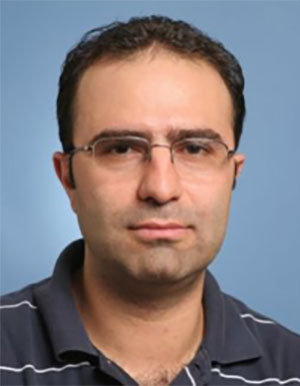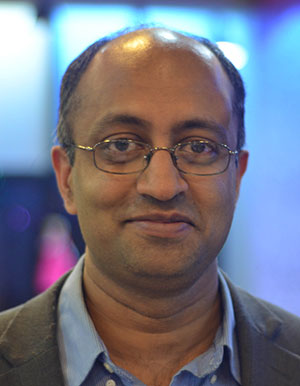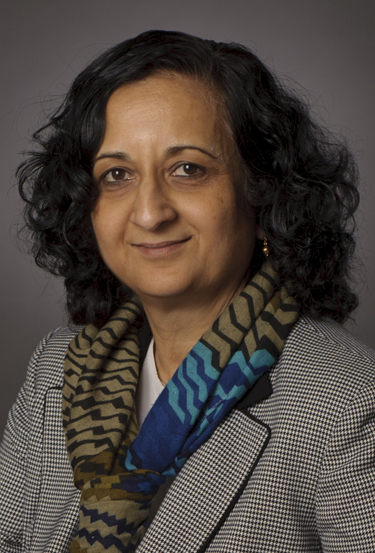 Prof. Hamed Mohsenian Rad
Prof. Hamed Mohsenian Rad
UC Riverside, USA
Title: Frontiers in Smart Grid Data Availability: From Synchro-Phasors to Synchro-Waveforms
Abstract: Electric power systems have taken drastic advances in deployment of new sensor technologies and communications infrastructure to support opportunities for new data availability in the field of smart grids. New measurement devices are developed and installed at scales in forms of advanced metering infrastructure, distributed energy resources monitoring systems, and high-resolution time-synchronized wide-area monitoring systems. These new technologies are generating immense volume of energy data. In this talk, we will explore the frontiers in smart grid data availability, with emphasize on synchronized phasor measurements (fundamental and harmonics) and synchronized waveform measurements. Real-world field data, data analytics, and innovative use cases will be discussed. Events and event-based situational awareness will be presented to translate the data into actionable information, under passive and active sensing scenarios. Example application opportunities will be explored in asset monitoring, analysis of system dynamics and oscillations, and monitoring incipient failures and extreme events.
Bio: Dr. Hamed Mohsenian-Rad is a Professor of Electrical and Computer Engineering and a Bourns Family Faculty Fellow at the University of California, Riverside, USA. His research interests include developing data-driven and model-based techniques for monitoring, control, and optimization of power systems and smart grids. Dr. Mohsenian-Rad has received the NSF CAREER Award, a Best Paper Award from the IEEE PES General Meeting, and a Best Paper Award from the IEEE Conference on Smart Grid Communications. In 2022, he received the Technical Achievement Award from the IEEE Communications Society for his Pioneering Contributions to Optimization and Data Analytics in Smart Grids. Two of his journal articles are currently ranked as the two most cited articles in the IEEE Transactions on Smart Grid. Dr. Mohsenian-Rad is the author of Smart Grid Sensors: Principles and Applications, Cambridge University Press, 2022, a textbook on smart grid sensors and data-driven applications. He is the Associate Director of the Winston Chung Global Energy Center, an endowed research center in the area of energy and sustainability at UCR. He is currently an Associate Editor of the IEEE Transactions on Power Systems. Previously, he served as Associate Editor of the IEEE Transactions on Smart Grid. He has served as the Lead PI for over $10 million smart grid research projects. He received his Ph.D. in Electrical and Computer Engineering from the University of British Columbia, Vancouver, Canada in 2008. Dr. Mohsenian-Rad is a Fellow of the IEEE.
 Prof. Antonello Monti
Prof. Antonello Monti
RWTH Aachen University, Germany
Title: How Open Source Is Going to Facilitate the Energy Transformation
Abstract: Open source is a reality in many sectors but not so strongly present in energy systems. Critical infrastructures have been in the past considering the open source approach as not reliable.
Governance of open source communities is changing this perception and opening the way for completely new paths. Open source may speed up the process of digitalization facilitating at the same time the energy transition.
The talk will report about concrete experiences in this field discussing both technical and structural aspects of the open source approach in energy.
Exemplary organisational structures such as Linux Foundation Energy and CRESYM will be used to show new models of cooperation that are speeding up processes in the energy system.
Bio: Antonello Monti received his Ph.D. degrees in electrical engineering from the Politecnico di Milano, Italy, in 1994. He started his career with Ansaldo Industria and then moved in 1995 to the Politecnico di Milano as an Assistant Professor. In 2000, he joined the Department of Electrical Engineering, University of South Carolina, Columbia, SC, USA, as an Associate Professor and then Full Professor. Since 2008, he has been the Director of the Institute for Automation of Complex Power System, E.ON Energy Research Center, RWTH Aachen University, Germany. Since 2019 he has a joined appointment at Fraunhofer FIT, Center for Digital Energy Aachen.
 Prof. Melike Erol-Kantarci
Prof. Melike Erol-Kantarci
University of Ottawa, Canada
Title: AI-Enabled Smart Grid Communications and Transactive Energy Systems
Abstract: In the past decade, Information and Communication Technologies (ICT) have enabled the modernization of the power grid and have led to many advances in smart grid technologies. Smart grid communications facilitate a large number of grid operations, including advanced metering, fault monitoring, microgrid control, transactive energy systems and so on. In parallel to advances in smart grids, communication technologies have been continuously evolving to provide better service to mobile users and vertical industries. Recently, machine learning has showed promising performance improvements in communication networks as well as smart grid operations. In this talk, we introduce novel AI-based tools that will allow a P2P energy trading platform, consisting of microgrids, to become a part of the future transactive energy systems. The energy trading platform relies on robust smart grid communications. We will show our recent results on low-latency communications that use reinforcement learning to support communication needs of such energy trading platforms.
Bio: Melike Erol-Kantarci is Chief Cloud RAN AI\ML Data Scientist at Ericsson and Canada Research Chair in AI-enabled Next-Generation Wireless Networks and Associate Professor at the School of Electrical Engineering and Computer Science at the University of Ottawa. She is the founding director of the Networked Systems and Communications Research (NETCORE) laboratory. She is also a Faculty Affiliate at the Vector Institute, Toronto. She has over 180 peer-reviewed publications which have been cited over 6700 times and she has an h-index of 41. She has received numerous awards and recognitions. Dr. Erol-Kantarci has delivered 70+ keynotes, tutorials and panels around the globe and has acted as the general chair and technical program chair for many international conferences and workshops. Her main research interests are AI-enabled wireless networks, 5G and 6G wireless communications, smart grid and Internet of things. She is an IEEE ComSoc Distinguished Lecturer, IEEE Senior member and ACM Senior Member.
 Prof. Biplab Sikdar
Prof. Biplab Sikdar
National University of Singapore, Singapore
Title: Machine Learning Based Security Solutions for Smart Grids: Challenges and Solutions
Abstract: Smart grids take advantage of information and communication technologies to achieve energy efficiency, automation and reliability. Increasingly, smart grids are seeing a proliferation of dynamic new components and devices on the distribution edge of the grid. The integration of these components has led to new strategies for the planning and operational management of grids, particularly through two-way communications and power flow between the grid and consumers. However, these bidirectional communications and the convergence of the information technology and operational technology (IT/OT) networks introduce several security and privacy threats to the grid and the consumers. While machine learning based techniques have the potential to secure smart grids against various cyber threats, they are vulnerable to various attacks that can not only jeopardize the applications and their users, but also serve to expand the overall threat landscape. This talk will start by with examples of security vulnerabilities in machine learning applications in real-world smart grid environments and provide an overview of various types of attacks on machine learning algorithms. We will then provide a framework for security evaluation for machine learning in smart grid applications and present security solutions for such systems. The presentation will conclude with an overview of some promising approaches for future work in machine learning based security for smart grids.
Bio: Biplab Sikdar is a faculty member in the Department of Electrical and Computer Engineering at the National University of Singapore, where he also serves as a Vice Dean in the College of Design and Engineering. He received the B. Tech. degree in electronics and communication engineering from North Eastern Hill University, Shillong, India, in 1996, the M.Tech. degree in electrical engineering from the Indian Institute of Technology, Kanpur, India, in 1998, and the Ph.D. degree in electrical engineering from the Rensselaer Polytechnic Institute, Troy, NY, USA, in 2001. He is a recipient of the NSF CAREER award (USA), the Tan Chin Tuan fellowship from NTU Singapore, the Japan Society for Promotion of Science fellowship, and the Leiv Eiriksson fellowship from the Research Council of Norway. His research interests include IoT and cyber-physical system security, network security, and network performance evaluation. Dr. Sikdar is an IEEE Distinguished Lecturer, an ACM Distinguished Speaker, and member of Eta Kappa Nu and Tau Beta Pi. He served as an Associate Editor for the IEEE Transactions on Communications from 2007 to 2012, IEEE Transactions on Mobile Computing from 2014-2017 and IEEE Internet of Things Journal from 2021 to present.
 Dr. Anuradha Annaswamy
Dr. Anuradha Annaswamy
Massachusetts Institute of Technology, USA
Title: Retail Electricity Markets and DER-hungry Grid Edge
Abstract: With increasing penetration of distributed energy resources (DERs)such as renewables, storage, and flexible loads in the distribution system, it is critical to design market structures that enable their smooth integration at the grid edge-to balance variable supply and demand, and increase the utilization of clean, renewable energy sources while maintaining affordability, reliability, and resilience. This talk focuses on the optimal design of retail local electricity market (LEM) structures to facilitate DER integration, increase market participation of DER owners, and leverage them to provide valuable grid services. The proposed LEM architecture is hierarchical in nature, and can be used to optimally schedule and coordinate DER injections across the distribution grid, via price-based market mechanisms instead of direct control or dispatch of DERs by the grid operator. The LEM can provide distribution grid services, specifically Volt-VAR control (VVC) for voltage regulation and conservation voltage reduction. It can accommodate unbalanced, multi-phase and meshed networks using Current-Injection based linear model for solving AC Optimal Power Flow at the primary level, employing McCormick envelopes convex relaxations. A distributed Proximal Atomic Coordination algorithm is used which preserves privacy, reduces communication requirements, and improves computational tractability. We also introduce 3-phase pricing, to motivate how we can determine the value of such grid services in real-time energy markets based on an optimization framework. We disaggregate the distribution locational marginal prices (d-LMP) and local retail tariffs among the different levels in the proposed LEM and decompose their components arising from economic objectives like maximizing social welfare and minimizing costs versus grid objectives like minimizing line losses and voltage profile deviations. Use case studies include modified IEEE-123 buses with high penetration of DER and realistic load profiles such as the Pecan street dataset.
Bio: Dr. Anuradha Annaswamy is Founder and Director of the Active-Adaptive Control Laboratory in the Department of Mechanical Engineering at MIT. Her research interests span adaptive control theory and its applications to aerospace, automotive, propulsion, energy systems, smart grids, and smart cities. She has received best paper awards (Axelby; CSM), as well as Distinguished Member and Distinguished Lecturer awards from the IEEE Control Systems Society (CSS) and a Presidential Young Investigator award from NSF. She is a Fellow of IEEE and IFAC. She is the recipient of the Distinguished Alumni award from Indian Institute of Science for 2021. She is the author of a graduate textbook on adaptive control, co-editor of two vision documents on smart grids and two editions of the Impact of Control Technology report, and a coauthor of two National Academy of Sciences, Engineering, and Medicine Committee reports related to electricity grids. She served as the President of CSS in 2020.





